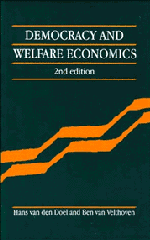6 - Implementation
Published online by Cambridge University Press: 03 May 2011
Summary
The power of bureaucracy
Bilateral monopoly
For a long time the literature on public administration suggested both that political decisions are made in parliament by elected politicians, including ministers, and that these decisions are implemented by bureaucrats appointed by the administration. This assumption goes back to Wilson ((1887)1970) and Weber ((1922) 1972) who regarded bureaucracy as the ideal type of a perfect hierarchy of trained professionals. According to this view the real bureaucrat is not engaged in politics but ‘administers’, i.e. he administers impartially. The bureaucrat will fulfil his duties ‘sine ira et studio’ (without passion and without partisanship). So he does not do what the politician always has to do, that is, fight. Taking sides, battle, passion – ira et studium – these are the essence of politics. The bureaucrat's professional honour lies in his ability at all times to carry out his superior's orders, conscientiously and scrupulously, irrespective of whether his objections to certain policies have been ignored (Weber, (1922)1972, pp. 551–79).
Yet, this classic view of bureaucracy must be discarded from an economic point of view. This became especially clear from an analysis of the bureaucracy in the Soviet Union. This bureaucracy had expanded to gigantic proportions so that phenomena which are inherent in every bureaucracy became caricatured and, because of this, became clearly visible. Nove (1961) and Ames (1965) broke new ground with the unmasking of the totalitarian myth, i.e. the myth that every Soviet bureaucrat actually did his duty.
- Type
- Chapter
- Information
- Democracy and Welfare Economics , pp. 148 - 174Publisher: Cambridge University PressPrint publication year: 1993



